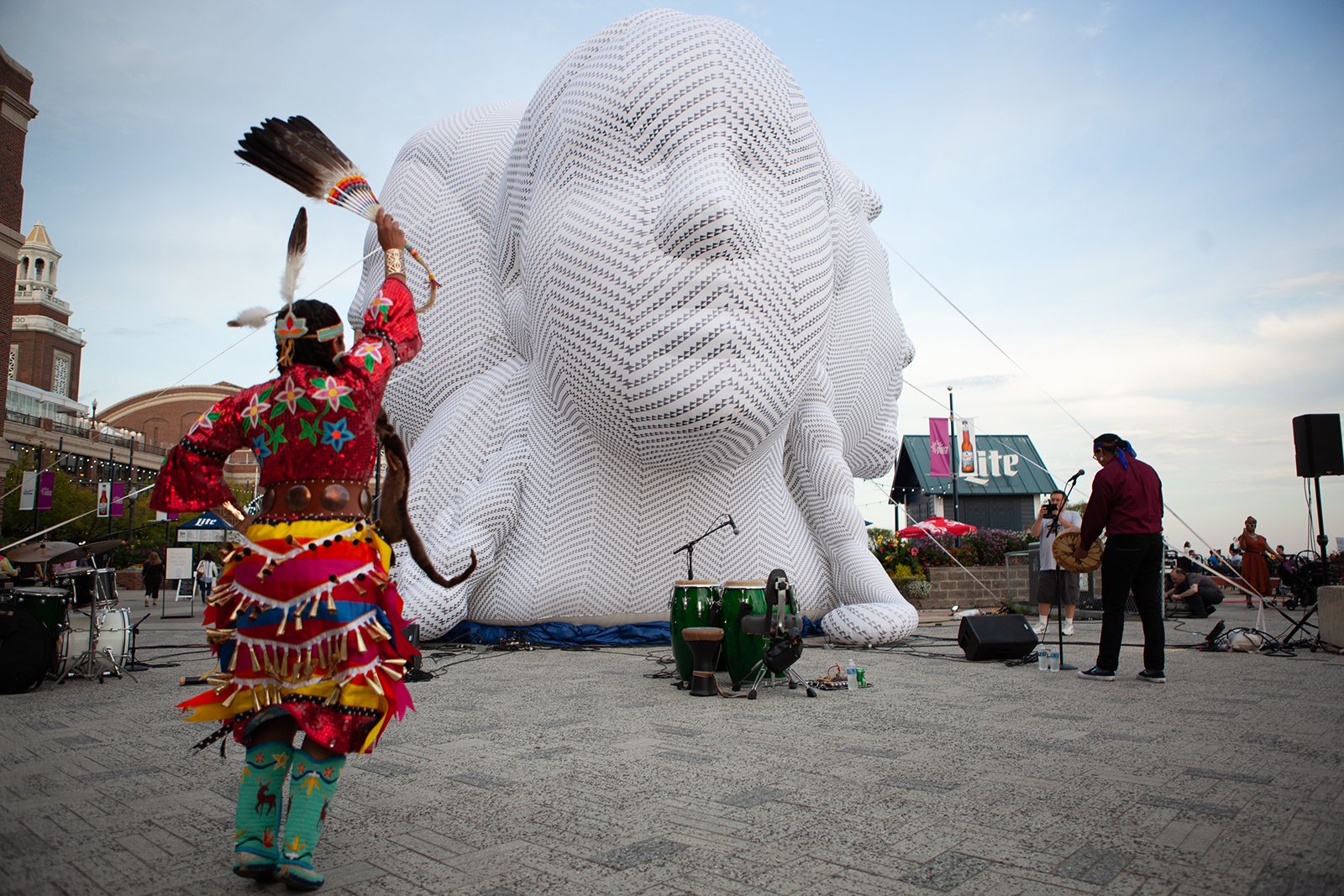Faheem Majeed
(he/him)
2011 - 2012 AIR
(Logan Center Gallery) (Arts Incubator)
www.faheemmajeed.com
Instagram: @faheemmajeedstudio
Faheem Majeed (American, b. 1976) is an artist, educator, curator, and community facilitator. He blends his unique experience as an artist, non-profit administrator, and curator to create works that focus on institutional critique and exhibitions that leverage collaboration to engage his immediate, and the broader community, in meaningful dialogue. As part of his studio practice, he transforms materials such as particle board, scrap metal and wood, discarded signs, and billboard remnants, breathing new life into these often overlooked and devalued materials. As its former executive director (2007-2011), Chicago’s South Side Community Art Center serves as Majeed’s primary muse. Majeed also serves as a co-director and founder of Floating Museum. Floating Museum is an art collective and non-profit that creates new models to explore relationships between art, community, architecture, and public institutions.
Majeed is a recipient of the Field and Macarthur Foundation’s Leaders for a New Chicago Award (2020), Joyce Foundation Award (2020), the Joan Mitchell Painters and Sculptors Grant(2015), and the Harpo Foundation Awardee(2016). Majeed’s work has been exhibited in numerous institutions including the Museum of Contemporary Art Chicago, Art Institute of Chicago, Malmö Konstmuseum, SMFA at Tufts, and the Hyde Park Art Center.
Currently Majeed is an assistant professor of art at the University of Illinois at Chicago.
In this 2021 Art Institute Chicago presentation, Majeed is interviewed by Tempestt Hazel. Hazel is a curator, writer, and co-founder of Sixty Inches From Center, a Chicago-based arts publication and archiving initiative. You can view the interview below.
Demise Shrouds
In 2021, Majeed completed a monumental charcoal rubbing of the historic South Side Community Art Center's facade. Known as a "demise shroud" the shroud appeared in the Hyde Park Community Art Center exhibition, Planting and Maintaining a Perennial Garden: Shrouds by Faheem Majeed. See more on their website.
Floating Museum
Majeed founded the collective “Floating Museum”, and is co-director alongside avery r. young, Andrew Schachman, and Jeremiah Hulsebos-Spofford. Floating Museum is an art collective that creates new models: exploring relationships between art, community, architecture, and public institutions. Using site-responsive art, design, and programming we explore the potential in these relationships, considering the infrastructure, history, and aesthetics of a space.
All that Light: Works Detail
1. Black Madonna
Faheem Majeed
2014
OSB particleboard and gold spray paint
Arts Incubator
Curator’s Notes
Faheem Majeed is recognized for his mastery of a range of mediums and materials. His "Black Madonna" elevates an everyday material such as particle board in this reconstruction of one of the most recognized symbols of the sacredness of maternal love.
Artist’s Notes
An artist, activist, and former board member of the South Side Community Art Center, Dr. Margaret Burroughs (American, 1915–2010) continues to exert great influence on Majeed, even after her passing. An homage to Burroughs, the figures— Madonna and Christ child—are appropriated from an etching she made that is now part of the South Side Community Art Center’s Collection.
Additional Reading:
14. If You Lived Here, You’d Be Home by Now
Faheem Majeed
2012
wood & decal
Logan Center Exhibitions
Curator’s Notes
Faheem Majeed is recognized for his mastery of a range of mediums and materials. This found sign, advertising a prospective residential building project, directly confronts Chicago's history of residential redlining and housing discrimination.
Artist’s Notes
The dismantling of Chicago’s public housing high rises in favor of mixed-income developments represents a new chapter in the city’s history. After several years of setbacks and harsh criticism, freshly minted Hope VI communities such as Oakwood Shores are finally starting to flesh out. I absconded with this sign before most of these projects broke ground, at a time when plans to revitalize this community were met with deep skepticism. Relative to what the neighborhood had devolved into over several generations, the architectural rendering of “The Arches at Oakwood Shores” registered as a cruel irony. Rather than being better accommodated, former residents had every right to suspect they were being displaced. Now that the homes are built, the irony has waned, becoming a vague wariness about the urban fabric under neo-liberal auspices where the problems with public services, whether schools, housing, or healthcare, is perceived to stem from the very fact that they are public.
23. My Socially Engaged Protest
Faheem Majeed
2016
Vinyl and marker
Logan Center Exhibitions - check back for scheduled appearances
Artist’s Notes
This piece is positioned as a protest against the role of artists as first wave gentrifying agents in the under resourced neighborhoods of Chicago. As an artist who is interested in utilizing his art and access to create platforms for others, this work also functions as an ironic, cautionary, and auto-biographic critique of my own practice and intent. The piece draws its inspiration from the cartoonish inflatable balloons often used to support and draw attention to labor protest and picket lines. As a way of challenging my past and current bodies of work I have been revisiting the sites of my past public work and photographing the inflatable in the same space.
Public responses to the piece are varied, but most often they are charged due to the positioning of the figures and the overt out of context references to power dynamics that impact our neighborhoods.
In this image the piece is positioned in front of the former South Shore Bank. What was once a heralded as a shining example of neighborhood banking. It is now boarded up and its windows are used as billboards. Numerous artists including myself have created work in response to closing of this bank.


